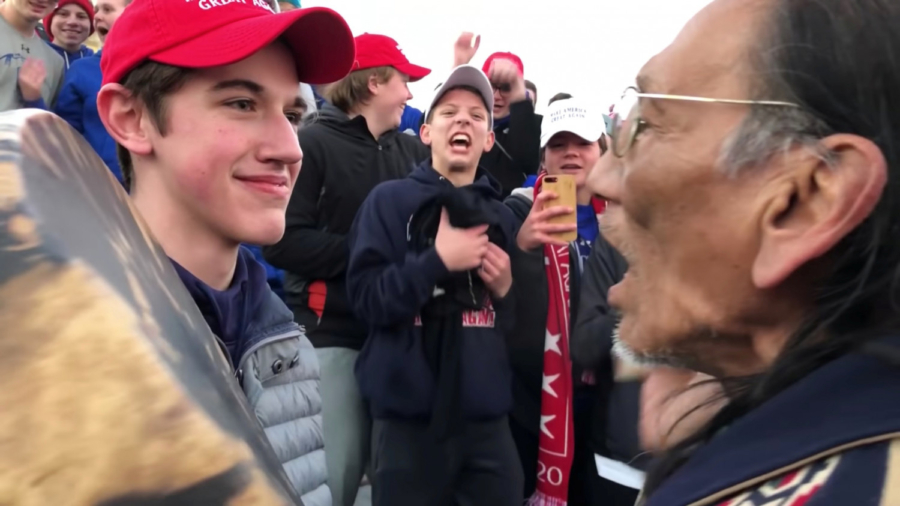Lawyer Robert Barnes named several celebrities and media personalities he intends to sue for libel against some students of the Covington Catholic high school, whom he represents.
In a Jan. 26 Fox News interview, Barnes specifically mentioned Reza Aslan, Iranian-American writer and commentator; Matthew Dowd, ABC News political analyst and former chief strategist for the George W. Bush campaign; actor Michael Rapaport; and The New York Daily News.
The trial lawyer took up the students’ case after media and social media whipped up a storm maligning the Kentucky students over their encounter with several Native American activists following the Jan. 18 March for Life in Washington.
Much of the initial coverage of the incident used short video clips that made it look like the students were chanting and cheering in mockery of Native American activist Nathan Phillips, 64. As longer videos from the scene document, the students, who were waiting for their bus near the Lincoln Memorial, started cheering and chanting school chants to drown out offensive remarks being made by a small group of Black Hebrew Israelites (BHI) nearby. Some of the students were wearing hats with President Donald Trump’s campaign slogans, such as “Make America Great Again.”
While Phillips told media outlets that the students harassed him, it was he who approached them, inserted himself into their crowd, and, for several minutes, banged his drum within inches of the face of one of the students, Nick Sandmann, who responded by standing silently with a smile.
Rancorous Response
The picture of Sandmann and Phillips looking at each other was plastered all over social media.
“Honest question. Have you ever seen a more punchable face than this kid’s?” Aslan said in a Jan. 19 tweet—a comment he hasn’t reconsidered.
“Folks, let us not let these kids, their parents, and their school off the hook. Regardless of what led up to this, this is awful,” Dowd said in a Jan. 21 tweet, sharing one of the shortened videos of the incident posted by CNN political analyst April Ryan.
“Libel. Lies. Retract & correct, or get sued,” Barnes replied on Jan. 21. Down has neither retracted, nor corrected.
Libel. Lies. Retract & correct, or get sued.
— Robert Barnes (@Barnes_Law) January 21, 2019
Rapaport went even further, posting an expletive-ridden video addressed to the students on Jan. 19, which he hasn’t taken down as of Jan. 28.
The New York Daily News found itself in Barnes’s crosshairs for a story that accused several Covington students of wearing “blackface”—coloring their faces black to mock black people.
The accusation traces back to a photograph from a basketball game that likely occurred between 2011-2013, when the Covington fans engaged in a “blackout”—a common occurrence in college sports where a team’s supporters coordinate to don all-black clothing and sometimes even paint their bodies and faces black, just as is visible in the photo, which was posted in 2015 to an online discussion forum. This usually only occurs when the team has black in its colors. There are, for instance, “whiteout” and “blueout” events for other colored teams.
In the photo, the students are seen shouting at a black player from the opposing team, but, as posts from the discussion forum show, Covington fans had, and possibly still have, a tradition of taunting inbounding players regardless of their race.
Libel Bar
Barnes explained it’s easier for private citizens to raise libel charges against a person who publishes false claims about them. Private citizens only need to prove negligence, such as failure to fact check, on the part of the publisher.
Public figures, on the other hand, need to prove “actual malice” to claim libel, which means the publisher knew the statement was false or acted with reckless disregard of whether it was false or not.
“In Kentucky, the law is even broader,” he said, mentioning that the mere “unflattering impression given and putting a person’s reputation in a false light” out of negligence is enough to sue for libel in the state.
Barnes said last week that the students’ families, in accordance with their Christian values, wanted to give people who maligned them a 48-hour grace period to correct and take back their statements.
“If they still refuse to do so, it’s clearly negligent for them to keep false statements up and they will be subject to a suit,” he said.
In addition to the case built by Barnes, Sandmann’s family hired a large Kentucky public relations firm and an aggressive libel lawyer, L. Lin Wood, WCPO reported.
Not only have the students been the targets of violent threats, but Barnes himself has received threatening messages, including a bomb threat he referred to the FBI and other law enforcement.
“The intensity has been really striking,” he told The Epoch Times in a prior phone interview.
From The Epoch Times

